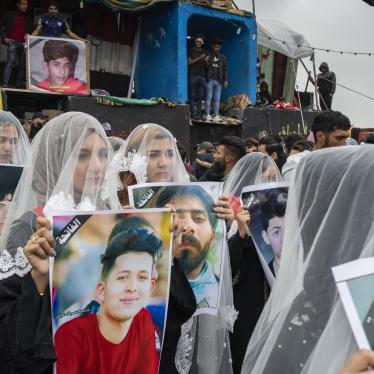(Beirut) – Bahrain’s failure to release political prisoners or hold accountable high officials responsible for torture, and its escalating campaign to silence human rights defenders, exposes the government's fraudulent claims that it is carrying out promised reforms, Human Rights Watch said today in its World Report 2013.
In 2012, authorities jailed human rights defenders for participating in peaceful demonstrations and criticizing officials, arbitrarily revoked the citizenship of dozens of opposition political activists, and frequently used excessive force to suppress peaceful protests, as well as those in which demonstrators threw rocks and Molotov cocktails. The government shelved the key November 2011 recommendations of an independent commission to address gross human rights abuses during the punishing repression of the largely peaceful mass demonstrations of early 2011.
“Unfortunately, 2012 was the year that Bahrain’s ruling family showed it prioritizes repression over reform,” said Joe Stork, deputy Middle East director at Human Rights Watch. “This year the government needs to act on its reform rhetoric by setting free all peaceful protesters, including the protest leaders still serving long prison terms for exercising their right to free speech and peaceful assembly.”
In its 665-page report, Human Rights Watch assessed progress on human rights during the past year in more than 90 countries, including an analysis of the aftermath of the Arab uprisings. The willingness of governments to respect rights will determine whether the Arab uprisings will give birth to genuine democracy or authoritarianism in new clothes, Human Rights Watch said.
Throughout 2012, the authorities regularly rejected demonstration permit requests from opposition groups and, in October, issued a two-month ban on demonstrations. According to opposition groups, at least 25 protesters and bystanders died in protest-related injuries in 2012. At least 15 of the deaths have been attributed to excessive or unlawful use of teargas. At least two security officers died of injuries from a Molotov cocktail attack, and the government said that clashes with anti-government protesters injured 1,500 policemen in 2012.
On August 16, a criminal court sentenced Nabeel Rajab, president of the Bahrain Center for Human Rights (BCHR), to three years in prison for organizing and participating in three demonstrations between January and March. In December, the Court of Appeal upheld the verdicts on most of the charges but reduced his sentence to two years. Security forces in December arrested Sated Yusuf al-Muhafadha, acting vice president of the BCHR, and prosecutors charged him with “disseminating false news” for allegedly posting on his Twitter account a photograph of an injured protester shot during an anti-government demonstration in Manama. He was released on January 17, 2013 pending trial.
The government has also placed new restrictions on freedom of association. On November 30, 2011, a few days after the Bahraini Lawyers’ Society elected new board members critical of government policies, the Social Development Ministry cancelled the election results. In July 2012, an administrative court ordered the dissolution of the opposition Islamic Action Association (Amal) after the Justice Ministry accused it, among other things, of failing to “convene a general conference for more than four years.”
In November 2011, the Bahrain Independent Commission of Inquiry (BICI), appointed by King Hamad bin Isa Al Khalifa, concluded that Bahrain’s security forces operated within a “culture of impunity” during the suppression of the 2011 protests. The BICI said that the abuses “could not have happened without the knowledge of higher echelons of the command structure” of the security forces, and called for independent and impartial investigations into allegations of abuses.
The government said it investigated allegations of wrongdoing involving more than 120 officers. However, most of the prosecutions involved low-ranking officers and did not include high-ranking officials or any Bahrain Defense Forces personnel. Human Rights Watch has been able to determine that courts have convicted four officers accused in the deaths of two protesters and the permanent disabling of another, and have acquitted at least three.
In 2012, the government severely restricted Human Rights Watch’s ability to visit Bahrain and report on rights violations, permitting only a very brief visit in April 2012.
On January 7, 2013, the Court of Cassation upheld the convictions and lengthy prison terms of 13 prominent dissidents, including life imprisonment for seven defendants, solely for exercising their rights to free expression and peaceful assembly in the 2011 protests.
“In 2012, the government shifted from talking about reforms to silencing critical voices, banning demonstrations, and restricting access to independent journalists and rights organizations,” Stork said. “These actions thoroughly discredit claims by Bahraini authorities of respecting human rights.”





